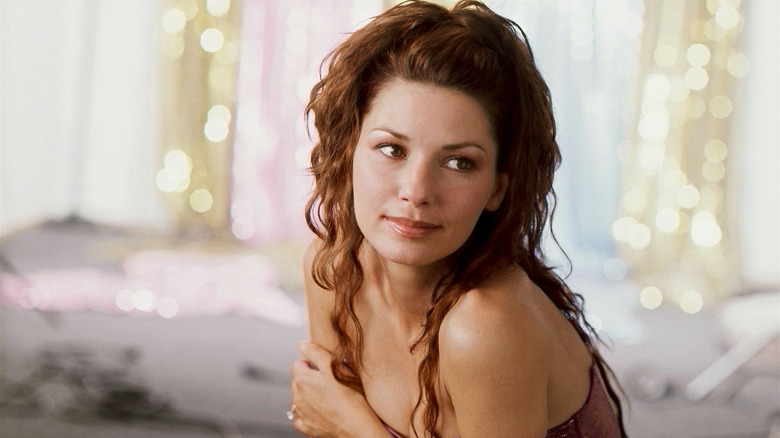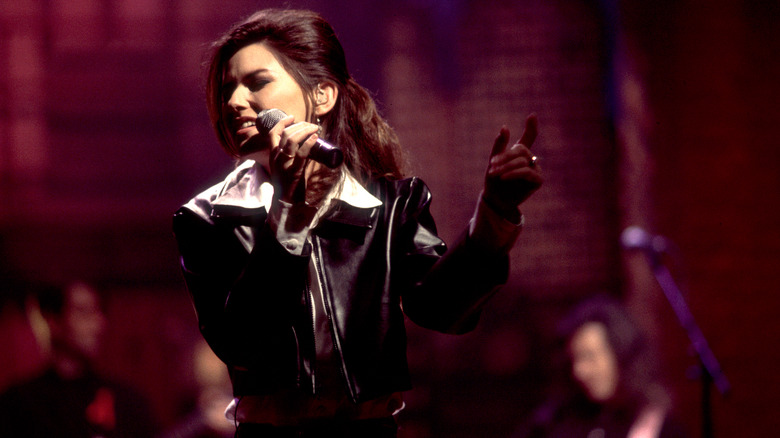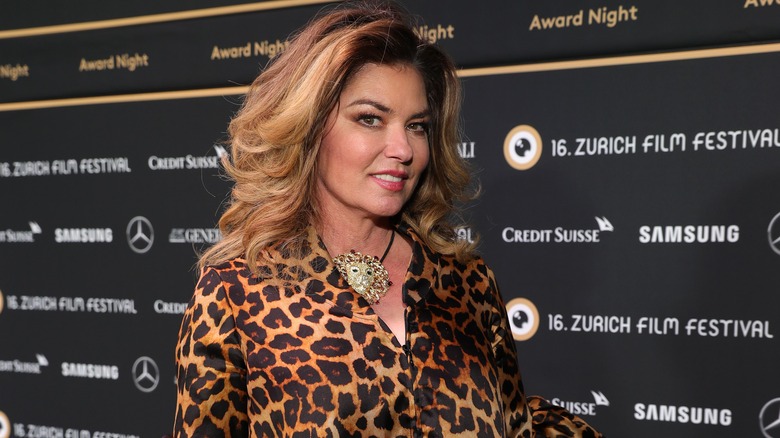Shania Twain's Real-Life Story Is Full Of Tragedy
Shania Twain is somewhat of a living legend, but many, especially younger generations, only first realized she existed when Harry Styles invited her onto the stage to perform her hit songs, "Man! I Feel Like A Woman" and "You're Still The One," with him at Coachella in 2022 (we're still waiting for those two to record the songs together and put it on Spotify, by the way). Twain is one of those rare artists who have managed to effortlessly cross over from country to pop shortly after her career took off — the '90s had Twain, and we have Taylor Swift.
While performing with Styles gave Twain some renewed exposure among young fans, she has been on the scene way longer than Styles; in fact, she's been selling albums like hotcakes since before he was born. Twain was born in 1965 in Windsor, Ontario, Canada, and if you're not a die-hard fan, this might be news to you: Her real name is not Shania, but Eilleen Regina Edwards. She didn't have a relationship with her biological father, so she took on the last name of her stepfather, Jerry Twain, who was a member of the Native American tribe called the Ojibwa.
Twain grew up in Timmins, Canada, and experienced a childhood that was anything but glamorous. In fact, it was often riddled with anxiety and fear. It's hard to imagine this when you look at her today, but Twain had to fight tooth and nail to get to where she is.
The superstar grew up in a poor family
Shania Twain didn't grow up a rich kid. In fact, she had less than most. Her family was poor, and Twain's only refuge from a very young age was music. She started singing when she was only 3 years old, and by the time she'd grown into a young girl, she was writing her own songs. During an interview with The Guardian, when Twain was asked whether she dreamed of becoming a famous singer, she answered, "No, I wanted to escape." When asked what from, she answered candidly, "Everything. Violent home. Tensions. Nothing to eat. When you're hungry you can't do anything about it but distract yourself from the hunger. And it really works. It's therapeutic. A lot of kids play with dolls, and I played with words and sounds."
Twain told ABC News that having nothing to eat was a regular occurrence in her childhood home and that she would often go to school with an empty stomach, envying the lunches of the kids around her. She was too proud to ask any of them for food, however. "I would certainly never have humiliated myself enough to reach out and ask for help and say,' You know, I'm hungry. Can I have that apple that you're not going to eat?' I didn't have the courage to do that," she said. Being hungry all the time made school challenging for young Twain. "It's very hard to concentrate when you're stomach's rumbling," she said.
Her stepfather was abusive to her mother
Shania Twain's stepfather, Jerry Twain, was incredibly violent. His outbursts are woven into Twain's worst childhood memories. The worst part was that violence and mental illness seemed to run in her family. "A third of my relatives were suicide deaths at young ages — that's not an exaggeration. A number of them died prematurely just from neglect and alcohol abuse," Twain told The Guardian.
From a young age, Twain witnessed the atrocities her stepfather committed, revealing plenty about her traumatic childhood in her memoir, "From This Moment On." "I was worried about my father killing my mother," Twain told The Guardian, adding, "I thought they'd kill each other. My mom was quite violent, too. Many nights I went to bed thinking: 'Don't go to sleep, don't go to sleep, wait till they are sleeping.' And I would wake up and make sure everybody was breathing."
If you or someone you know is dealing with domestic abuse, you can call the National Domestic Violence Hotline at 1−800−799−7233. You can also find more information, resources, and support at their website.
If you or someone you know needs help with mental health, please contact the Crisis Text Line by texting HOME to 741741, call the National Alliance on Mental Illness helpline at 1-800-950-NAMI (6264), or visit the National Institute of Mental Health website.
Shania Twain's stepfather also abused her sexually
Shania Twain's stepfather turned his violence on her, too. She told The Guardian that he abused her "physically and psychologically." When asked whether the abuse was ever sexual, she hesitated before answering, "Oh yes, sexually ... I'm not going to go into details about it." She added that she didn't mind being open about the experience, however, because she wants people to know she survived it, and they can, too.
Twain was a little more open about the sexual abuse during an interview with The Times. "[I]t was terrible – you didn't want to be a girl in my house," she said, explaining that she started hiding her body because she became ashamed of it and wanted the abuse to stop. "I hid myself," she told the outlet. "I would wear bras that were too small for me, and I'd wear two, play it down until there was nothing girl about me. Make it easier to go unnoticed."
There were times she fought back against her abusive stepfather, specifically during one incident where an 11-year-old Twain hit him with a chair, breaking it. In retrospect, Twain thinks she managed to do that out of anger, not necessarily bravery.
If you or anyone you know has been a victim of sexual assault, help is available. Visit the Rape, Abuse & Incest National Network website or contact RAINN's National Helpline at 1-800-656-HOPE (4673).
Her mother was encouraging but distant
Shania Twain's mother supported her daughter and her dreams in every way she could. Despite the family being short on money, she tried to pay for singing lessons so her daughter could develop her vocal talent. Twain eventually found herself performing in bars to make some money to pay the bills. She was only 8 years old at the time, she told The Guardian. Twain told ABC News that, if it hadn't been for her mother's encouragement, she would never have stepped onto a stage. "I wouldn't have done it by myself. I would have shied away from it. I would have shied away from my fears," she said, explaining that she never enjoyed being in the spotlight as a kid.
Even though she tried to support her daughter's dream, Twain's mother was often distant. "My mother was always ... very isolating of herself," Twain revealed. "I don't still really understand why. She's not alive anymore for me to ask her. I wish I could, but she was always that person that was watching life happen from inside through a window." She explained that her mother didn't live life fully and was often sad. When she was 10 years old, Twain wrote her first song, which was dedicated to her mother and titled, "Mama Won't You Come Out to Play." It was a little girl's plea for her mother to crawl out of her shell and enjoy life with her daughter.
Her parents died in a car accident
The shock of losing a parent is indescribable, but losing both parents at the same time is more tragic than anyone can imagine. After surviving a volatile childhood, Shania Twain was faced with this reality. Even though she didn't exactly have the best relationship with her parents, their deaths were absolutely devastating for her. When Twain's sister called her with the news, she was 22 and studying computer programming. The news brought the singer's life to a complete standstill. "I just, you know, I fell apart totally, just into shock for days, and I just couldn't let go of them," she told Today.
Twain explained that her mother and stepfather were the foundation on which her life was built. Losing them both in such a tragic way shook up her whole life. "As rickety as it was, it was still a foundation ... My whole life history was there, with them, and many of the associations fell along the way, away, after my parents died. It was so true that so much of my life was stemming from them being in my life — the good and the bad," she said.
The artist had to raise her siblings by herself
Shania Twain never got around to processing her parents' deaths. She never dealt with it, in part because she suddenly had to step up and take care of her three younger siblings, still minors at the time.
"My younger sister was still living at home and my two younger brothers were still, you know, 13 and 14 years old," she told Today. "We all agreed that they shouldn't be separated. But no relatives were able to take both of them in. So the only way to keep them together was for us to stay together," she continued. For Twain, keeping her family together had always been the most important thing — even when her parents were still alive. Despite the violence and abuse in their home, she never sought help from Children's Aid because she knew she and her siblings would more than likely be separated if she did, she told The Guardian.
After her parents' tragic deaths, Twain supported her family for the next six years in the only way she knew how — by singing. She landed a gig at a local resort shortly after their deaths, and it helped her pay the bills. "It was like, 'This is all I know how to do. I've got to support the kids.' That gave me a motivation and a fearless state of mind, because when you don't have a choice, you've got to push through — and that's what I did," she told People.
Shania Twain didn't get the recognition she deserved in her early career
It's a tale as old as time — when you're a woman in the entertainment industry, your success is often attributed to the men who work with you, and Shania Twain faced the same conundrum when her career took off after her 1995 album, "The Woman in Me."
Robert "Mutt" Lange produced the album (the two would later get married) and continued to work with Twain on her next albums. He was good, but so was she. Her 1997 album, "Come on Over," was much like Taylor Swift's "1989" — she crossed over from country to pop with ease, leaving some males in the business feeling a little threatened.
Soon, she had to deal with the assumption that her success was all thanks to the men who worked with her. This, of course, wasn't easy to deal with. "It was very offensive to be considered a molded artist, that it took a man or a team to mold me," Twain told People. "I bit my tongue a lot. But when you're in the industry from a young age as a woman, you really learn how to let it roll off your back." Suffice it to say, almost two decades later, it's crystal clear that Twain deserved the recognition she received back then — even after a 15-year hiatus, she's still killing it, sans those former male collaborators.
Her husband cheated on her with her best friend
Imagine you suspect your husband is cheating. You're worried and tell your best friend about your concerns. She tells you you're crazy, that your husband would never dream of being unfaithful to you. Not long after, you find out that, not only were your suspicions accurate, but the person your husband cheated with is the very friend you confided in. This is Shania Twain's story.
Twain and Robert "Mutt" Lange were married for 14 years before filing for divorce after Twain found out about his affair with her best friend, Marie-Anne Thiébaud. Divorce wasn't Twain's first choice, however. She told The Guardian that the belief that families need to stay together, which had been ingrained in her since childhood, made her want to stay with Lange for the sake of her son, Eja. "I would be one of those people who would keep my marriage together for my child ... I tried to keep Mutt," she admitted.
While making an appearance on the "Armchair Expert" podcast, Twain revealed that her husband's infidelity nearly broke her. "I was uncontrollably fragile over it, which I had never felt before ever because I thought for once I was stable. I really believe that I'm safe, so that really devastated me I think more than any other instability I've ever felt," she said, adding that she felt stupid for not realizing what was happening right under her nose.
Shania Twain became depressed after her husband's infidelity
When Shania Twain found out her husband had cheated on her with her best friend, her whole world came crashing down. While her heart was in pieces, she also dealt with red-hot anger. "It wasn't just, 'Infidelity happens.' That was not me. I spun around in that for quite a while. That was the hardest part to let go of really — the anger," she said while appearing on the "Armchair Expert" podcast.
The affair brought Twain's unprocessed childhood trauma to the surface. She admitted to The Guardian that she hated her friend for what she did. She'd lost both her husband and her friend, and, eventually, she found herself not wanting to live anymore. Her son, Eja, was one of the only reasons she held on. She knew she needed to be there for him. During this dark time, Twain also finally began dealing with all the trauma she experienced. Ironically enough, it's what helped her heal. "I started peeling back the layers of pain I was in and all the other griefs and disappointments and challenges came to the surface. And I thought: 'I've been through worse and it's time to put it all into perspective,'" she said.
If you or someone you know is struggling or in crisis, help is available. Call or text 988 or chat 988lifeline.org
She once had a stalker
In 2009, Shania Twain began receiving letters from Giovanni (John) Palumbo. Initially, she didn't think much of them, but when he continued to write to her and repeatedly declared his everlasting love for her, she got worried. "I love you more than quotes can describe. I love you more than anything in the universe. I need you more than anyone else in the world," one of his letters to Twain read (via CBC). Twain was becoming increasingly uncomfortable with the letters, which kept coming. She got really scared when Palumbo started tracking her location and showed up wherever she went — even once making a stop at her house and sending her flowers. Later, he showed up at her grandmother's funeral.
When Palumbo showed up at the 2011 Juno Awards, where Twain made an appearance, he finally got arrested, and a trial followed. Palumbo initially pleaded not guilty, but changed his plea when he heard Twain's testimony about how his actions had affected her. He appeared to regret his actions, saying he never meant for Twain to feel threatened by him. He ended up with a strict restraining order and three years of probation.
The star contracted Lyme disease
When Shania Twain went horseback riding in Norfolk, Virginia, in 2003, she had no idea the excursion would change her life forever. During the ride, she got bit by a Lyme tick, and the disease that followed almost meant the end of her career.
In a Netflix documentary, "Not Just a Girl," Twain reveals what dealing with this debilitating disease was like and how scary it was to have no idea what was wrong with her. "My symptoms were quite scary because before I was diagnosed, I was on stage very dizzy. I was losing my balance, I was afraid I was gonna fall off the stage...I was having these very, very, very millisecond blackouts, but regularly, every minute or every 30 seconds," she revealed (via Vanity Fair).
While those symptoms on their own were terrifying, nothing compared to the terror Twain started to experience when she realized she was having trouble using her voice. Phone calls were an effort, while going out and speaking to friends in a noisy restaurant was even more so. "It's very debilitating," she told Loose Women. "Our voice is such a huge part of our self-expression, and for a vocalist, a singer, obviously ... it's devastating in so many ways."
She was diagnosed with dysphonia
When Shania Twain realized her voice wasn't recovering on its own, she sought medical help. She initially thought it was a side effect of the trauma she experienced after learning of her husband's affair. "I figured mentally that I would never sing again," she told Oprah Winfrey in 2011 (via Billboard). This was, in part, because she and her husband worked so closely together on her music. "My fears and anxieties throughout my whole life have been slowly squeezing my voice," she added. "I was losing it slowly and progressively."
Twain told ABC News in 2011 that she was eventually diagnosed with dysphonia after her divorce. "The muscles literally constrict the voice box and prevent air from flowing properly," she explained. "You don't get any volume, which is not very good for a singer." Dysphonia does not affect the vocal cords but, rather, limits their ability to function.
As it later turned out, the loss of Twain's voice wasn't just due to dysphonia, it was a complication of Lyme disease. She had vocal cord paralysis, and the prognosis didn't look good. "I never thought I'd sing again," she told The Guardian. Even more frustrating, Twain had to endure her weakening voice for years before doctors finally figured out what was wrong. [It took] a good seven years before a doctor was able to find out that it was nerve damage to my vocal cords directly caused by Lyme disease," she told Loose Women in 2020.
Shania Twain underwent open-throat surgery
When she started experiencing problems with her voice, Shania Twain did what any sensible singer would do and saw a voice doctor. It wasn't the right doctor. "I never thought of going to a neurologist," Twain told Graham Norton while making an appearance on "The Graham Norton Show" in 2023 (via the Independent). "I had Lyme disease, I knew that, but I didn't know it would be associated to the voice," she added.
In order to fix the nerve damage on her vocal cords, Twain had to undergo open-throat surgery. As if that wasn't scary enough, she also had to be awake for the procedure. "The reason you have to be awake for it is so you can sing during the operation. They have to be able to see your larynx in action," Twain explained during an interview on "Lorraine." While she didn't deny that the procedure was scary, she had another fear that overshadowed it. "I was more afraid of never singing again than getting through the operation," she said during the interview, adding, "I just chose the lesser of the two fears, I guess."
As with most operations concerning the vocal cords, Twain's voice was altered a bit following the procedure. "You can hear my raspy, airy sexy voice now; it's a very different voice," she revealed on the "Graham Norton Show." Twain added that her newfound volume was also a nice surprise.
She almost died of Covid
As if having your life completely altered by Lyme disease isn't traumatizing enough, Shania Twain also had a brush with death when she contracted COVID-19 during the pandemic.
During a 2023 interview with the Mirror, Twain revealed that her Covid infection progressed to pneumonia. She was recovering at home with her husband, Frédéric Thiébaud, who was taking care of her. He constantly monitored her vital signs in case she needed to go to the hospital. Twain started having trouble breathing, and Thiébaud tried to arrange for her to be taken to the hospital via helicopter. The only problem was that hospitals were overflowing, and he couldn't find her a bed at first.
"My husband was freaking out, to be honest," Twain told the outlet. "He was panicking because he was the one having to pull it all together." She can still recall the flight to the hospital. "It was like science fiction, I felt like I was going to another planet or something. It all kind of happened in slow motion," she said. Twain received plasma therapy upon arrival at the hospital. She was very sick, and it took her a long time to recover. "It took several days to start building up any antibodies at all, so it was a very dangerous time and very scary. I made it through and I'm just so grateful," she said. Twain even wrote a song about the experience titled, "Inhale/Exhale Air."
The singer was terrified to sing again
Shania Twain might be one of the bravest women on the planet, but when it came to restarting her music career, she was nothing short of terrified. For one, her ex-husband used to be her producer — they did everything together — and now she found herself having to reclaim her career all on her own.
"It took a long time to be ready to write and record again," she revealed in the Netflix documentary "Not Just a Girl" (via Vanity Fair). "It was an exercise of saying, 'Okay, look, you can't just not ever make music again because you don't have [your ex-husband]. You gotta just dive in.' And I was petrified, I really was," she admitted.
It wasn't just writing and producing new music without her ex-husband for the first time that had Twain scared — it was also learning to use her voice again after her open-throat surgery. "After I had the surgery, I was petrified to make a sound. I didn't know what was going to come out," she told InStyle. But she overcame this fear as well. "I just had to take the leap and make a sound. And I was so excited about what came out," she told the outlet. With her newfound vocal power, Twain began writing up a storm and released her first album after her vocal surgery titled "Queen of Me" in 2023.
She could lose her voice one day
Despite her successful open-throat surgery, Shania Twain's new voice might not last indefinitely. She told InStyle that one reason she basically went on a songwriting marathon after her surgery is that she knows this might not last forever. "It's a reminder, don't take time for granted," she said. "Don't take the opportunity for granted. It's possible I might lose it, that it may not last. I guess any prosthetic or support that you get that is synthetic, your body still may give out around it. It could happen," she admitted.
Speaking to TalkShopLive (via People), Twain said the surgery's results might decline as she ages and that she could eventually be faced with the choice of undergoing the surgery again or leaving it be. While talking to InStyle, she said that, should she lose her voice again, she would continue writing songs but have other artists sing them. "I will be sad to lose that expression, but I know I've done everything I can, so it won't devastate me in that sense. I know that I persevered," she said.
After everything she's been through, Twain has learned to embrace her imperfections instead of trying to hide them — both literally and figuratively. "It's supposed to go away," she says of her throat surgery scar (via The Guardian), adding, "But if it stays I don't care. This is the difference. Whatever scars I have, I've earned. I'm comfortable in my own skin."
















